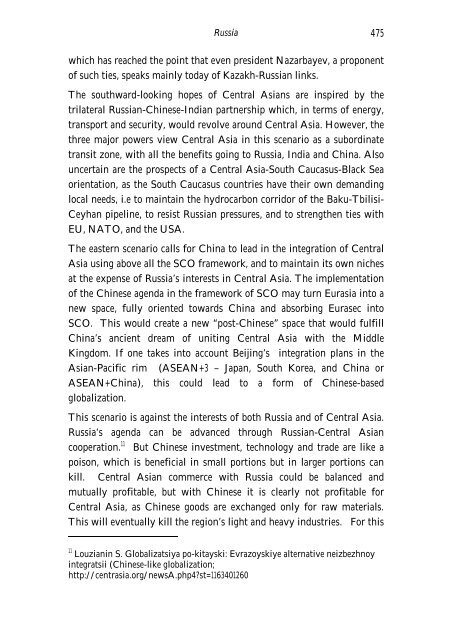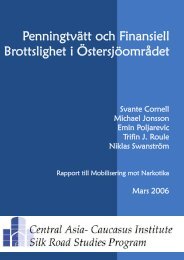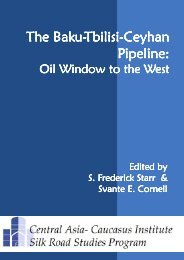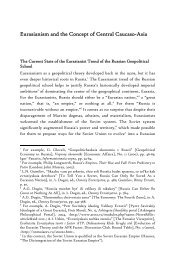Russia - Central Asia-Caucasus Institute and Silk Road Studies ...
Russia - Central Asia-Caucasus Institute and Silk Road Studies ...
Russia - Central Asia-Caucasus Institute and Silk Road Studies ...
You also want an ePaper? Increase the reach of your titles
YUMPU automatically turns print PDFs into web optimized ePapers that Google loves.
<strong>Russia</strong> 475<br />
which has reached the point that even president Nazarbayev, a proponent<br />
of such ties, speaks mainly today of Kazakh-<strong>Russia</strong>n links.<br />
The southward-looking hopes of <strong>Central</strong> <strong>Asia</strong>ns are inspired by the<br />
trilateral <strong>Russia</strong>n-Chinese-Indian partnership which, in terms of energy,<br />
transport <strong>and</strong> security, would revolve around <strong>Central</strong> <strong>Asia</strong>. However, the<br />
three major powers view <strong>Central</strong> <strong>Asia</strong> in this scenario as a subordinate<br />
transit zone, with all the benefits going to <strong>Russia</strong>, India <strong>and</strong> China. Also<br />
uncertain are the prospects of a <strong>Central</strong> <strong>Asia</strong>-South <strong>Caucasus</strong>-Black Sea<br />
orientation, as the South <strong>Caucasus</strong> countries have their own dem<strong>and</strong>ing<br />
local needs, i.e to maintain the hydrocarbon corridor of the Baku-Tbilisi-<br />
Ceyhan pipeline, to resist <strong>Russia</strong>n pressures, <strong>and</strong> to strengthen ties with<br />
EU, NATO, <strong>and</strong> the USA.<br />
The eastern scenario calls for China to lead in the integration of <strong>Central</strong><br />
<strong>Asia</strong> using above all the SCO framework, <strong>and</strong> to maintain its own niches<br />
at the expense of <strong>Russia</strong>’s interests in <strong>Central</strong> <strong>Asia</strong>. The implementation<br />
of the Chinese agenda in the framework of SCO may turn Eurasia into a<br />
new space, fully oriented towards China <strong>and</strong> absorbing Eurasec into<br />
SCO. This would create a new “post-Chinese” space that would fulfill<br />
China’s ancient dream of uniting <strong>Central</strong> <strong>Asia</strong> with the Middle<br />
Kingdom. If one takes into account Beijing’s integration plans in the<br />
<strong>Asia</strong>n-Pacific rim (ASEAN+3 – Japan, South Korea, <strong>and</strong> China or<br />
ASEAN+China), this could lead to a form of Chinese-based<br />
globalization.<br />
This scenario is against the interests of both <strong>Russia</strong> <strong>and</strong> of <strong>Central</strong> <strong>Asia</strong>.<br />
<strong>Russia</strong>‘s agenda can be advanced through <strong>Russia</strong>n-<strong>Central</strong> <strong>Asia</strong>n<br />
cooperation. 11 But Chinese investment, technology <strong>and</strong> trade are like a<br />
poison, which is beneficial in small portions but in larger portions can<br />
kill. <strong>Central</strong> <strong>Asia</strong>n commerce with <strong>Russia</strong> could be balanced <strong>and</strong><br />
mutually profitable, but with Chinese it is clearly not profitable for<br />
<strong>Central</strong> <strong>Asia</strong>, as Chinese goods are exchanged only for raw materials.<br />
This will eventually kill the region’s light <strong>and</strong> heavy industries. For this<br />
11 Louzianin S. Globalizatsiya po-kitayski: Evrazoyskiye alternative neizbezhnoy<br />
integratsii (Chinese-like globalization;<br />
http://centrasia.org/newsA.php4?st=1163401260






